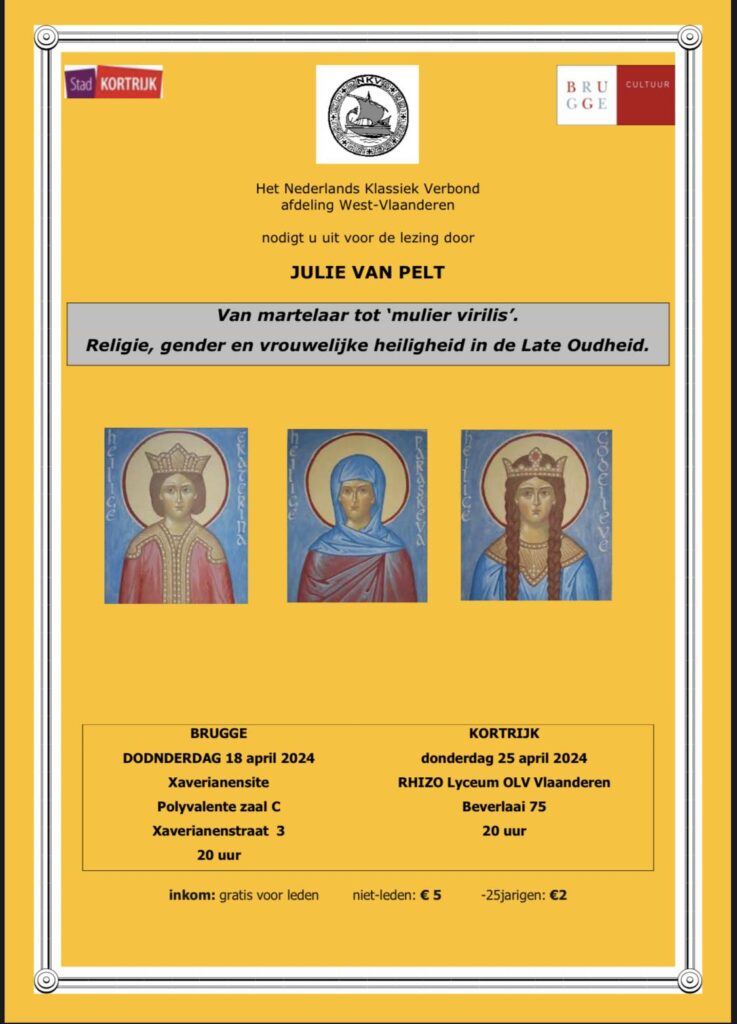“Romancing Rhetoric: Imperial Fiction and Late-Antique Rhetorical Theories and Practices”
Ghent University, September 25-26, 2025. De Krook, Miriam Makebaplein 1, Ghent
Organizers: Dr Nicolò D’Alconzo and Prof. Koen De Temmerman
Please register via https://event.ugent.be/registration/RomancingRhetoric by 11th September 2025.
Whereas overlaps between rhetoric and Latin and Greek fiction from the Imperial era have long been identified and discussed, most of the work done so far has examined how fiction adopts and builds on rhetorical concepts. This conference proposes instead the opposite route and examines to what extent and how Imperial fiction itself, given its rhetorical nature, contributed to shaping rhetorical theory and practice in the 4th to 6th centuries.
In particular, we are interested in seeing how the practices of ancient fiction in Imperial times (for instance, but not limited to, the extant and fragmentary novels, both so-called ‘pagan’ and early Christian fictional(ized) biographies, imaginative travel accounts, paradoxography, collections of letters, etc.) may have influenced the theory, practice and/or teaching of rhetoric in Late Antiquity (treatises, declamations, orations, progymnasmata, letters, panegyrics, ekphrases, etc.). We hope to reach a better understanding of the narrative and fictional qualities of late-antique rhetorical writing, of the late-antique reception of Imperial fiction, and of rhetoricians as readers of fiction. In this conference we explore the presence of fiction in late-antique rhetorical writing and welcome case studies from a range of texts in Greek and Latin, as well as theoretical approaches.
Programme
Day 1 – Thursday 25/09/2025
9.40-10.00 Welcome and opening remarks (Koen De Temmerman, Nicolò D’Alconzo)
SESSION 1 Education
10.00-10.45 Fotini Hadjittofi (Lisbon): Paideia versus Eros: Testing the Limits of Novelistic Love in Gazan Rhetoric.
10.45-11.15 Valentina Barrile (Ghent): Rhetoric, Novels and Education: a Three-way Contamination?
11.15-11.45 Coffee Break
11.45-12.30 Ruth Webb (Lille): Declamation and the Unthinkable: Chorikios Decl. 9 and the Death of the Heroine.
12.30-13.00 Andreas Prasinos (Glasgow): Exemplum and Rhetoric: The Moral Power of Fiction in Apuleius’ Metamorphoses and Late-Antique Rhetorical Practice.
13.00-14.30 Lunch Break
SESSION 2 Practices
14.30-15.15 Laura Miguélez-Cavero (Madrid): Nonnus’ Fictional Habits: On how to Borrow from the Novel (Achilles Tatius) and History (Herodotus).
15.15-16.00 Richard Flower (Exeter): Storied Emperors: Fiction and Latin Panegyric in Late Antiquity.
16.00-16.30 Coffee Break
16.30-17.00 Chiara Militello (Catania): Rhetorical Devices and Imperial Fiction in Damascius’ Philosophical Turn.
17.00-17.45 Gianfranco Agosti (Pisa): Stories People Like. Fictional Strategies and Audiences in Late Antiquity.
19.00 Conference dinner
Day 2 – Friday 26/09/2025
SESSION 3 Ekphrasis
10.00-10.30 Elena Claudi (Warwick): Looking Forward in Ekphrasis: Illusion in the Imagines of Philostratus and the Descriptions of Callistratus.
10.30-11.00 Arianna Canu, Viola Palmieri (Tübingen): Through the Eyes of the Guide: Theory in the Practice of Ekphrasis from Imperial Age to Late Antiquity.
11.00-11.30 Coffee Break
11.30-12.00 Carlos Amado Román (Extremadura): Rhetorizing the Nile: Achilles Tatius and Himerius.
12.00-12.30 Koen de Temmerman (Ghent): A Meadow Imitating a Painting: Procopius of Gaza on Fiction.
12.30-14.00 Lunch Break
SESSION 4 Letters
14.00-14.45 Lieve Van Hoof (Ghent): Narrating One’s Life in Letters and Speeches: A Comparison of Libanius’ Letter Collection and Autobiography.
14.45-15.15 Amedeo Raschieri (Independent): Rhetoric and Self-Representation in Late Antiquity: The Interplay Between Ennodius’ Letters and Dictiones.
15.15-15.45 Steven Smith (Boston): Achilles Tatius’ Leukippe & Kleitophon and Theophylact Simocatta’s Letters: Nature, Language, and Gender.
15.45-16.15 Coffee Break
16.15-16.45 Cristiano Minuto (Naples): On the Reception of Heliodorus’ Aethiopica in Aristaenetus’ Letters: Calasiris’ Narrative as a Case Study.
16.45-17:15 Giuseppe Zanetto (Milan): ‘Milesian Aristaenetus’: How to Liven up Rhetorical Prose?
17.15:17.30 Closing Remarks
 Evelien Bracke and Koen De Temmerman warmly invite you to a symposium on ancient narrative and its reception, organized in tribute to the late Prof. Saiichiro Nakatani (1972-2023).
Evelien Bracke and Koen De Temmerman warmly invite you to a symposium on ancient narrative and its reception, organized in tribute to the late Prof. Saiichiro Nakatani (1972-2023).